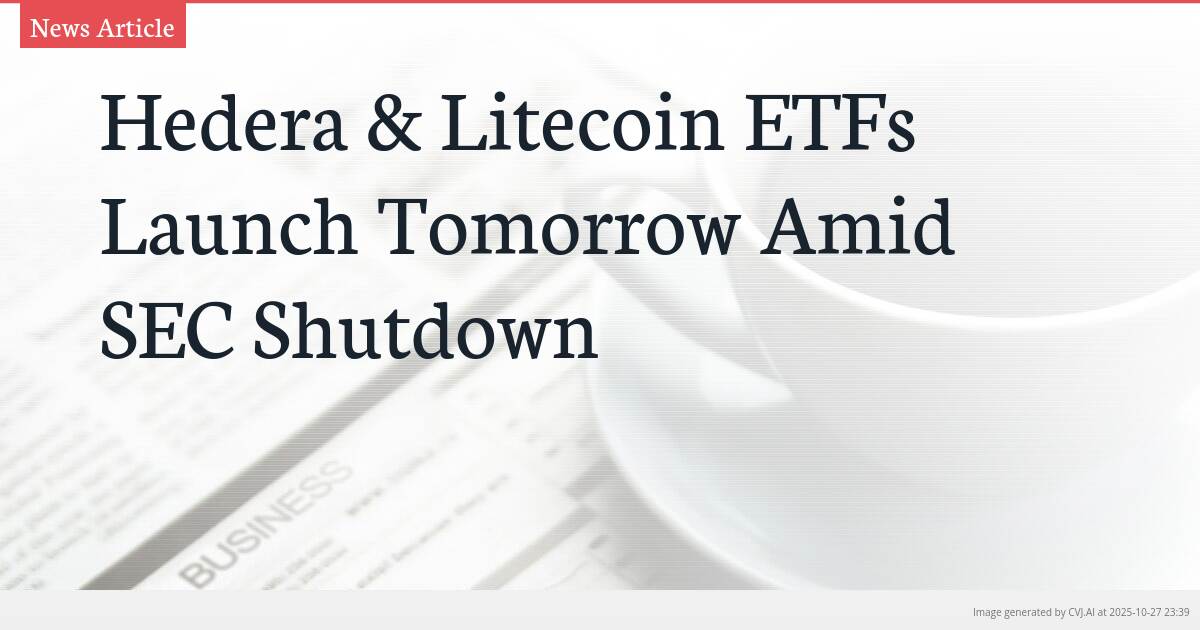This summary text is fully AI-generated and may therefore contain errors or be incomplete.
Introduction
Major cryptocurrency ETFs for Hedera (HBAR) and Litecoin (LTC) are set to debut tomorrow despite the ongoing government shutdown, marking a significant milestone in crypto market integration with traditional finance. The launches proceed smoothly thanks to strategic legal provisions that bypass the need for manual SEC approval, with the New York Stock Exchange certifying filings for multiple crypto investment vehicles including Bitwise’s spot Solana ETF and Grayscale’s GSOL conversion. This development has already sparked immediate price recoveries for both digital assets, with Litecoin reclaiming the $100 level and both cryptocurrencies posting approximately 2% gains.
Key Points
- Strategic legal provisions in amended S-1 filings enable automatic ETF effectiveness after 20 days, bypassing need for manual SEC approval during government shutdown
- NYSE has certified 8-A filings and issued listing notices for multiple crypto ETFs including Bitwise's Solana ETF and Grayscale's GSOL conversion alongside Hedera and Litecoin products
- Market immediately responded positively with Litecoin surging 2% to reclaim $100 and Hedera posting similar gains of 2.1% following the ETF announcement
Strategic Legal Maneuvering Enables ETF Launch During Government Shutdown
The successful launch of Hedera and Litecoin ETFs during a government shutdown represents a masterclass in regulatory navigation by cryptocurrency issuers. According to reports from crypto journalist Eleanor Terret, the key breakthrough came from strategic provisions included in amended S-1 filings that enable automatic effectiveness 20 days after filing. This clever legal mechanism ensures a seamless transition to trading without requiring manual SEC approval, which would normally be impossible during the current government shutdown that has suspended many regulatory functions.
Bloomberg’s ETF expert Eric Balchunas confirmed the significance of this development on social media, noting that “assuming there’s not some last min SEC intervention, looks like this is happening.” The completion of crucial 8-A filings and the issuance of listing notices by the New York Stock Exchange further cement the pathway for these investment vehicles. This approach demonstrates how cryptocurrency firms are adapting to regulatory challenges while continuing to expand market access for digital assets through traditional financial infrastructure.
Multiple Crypto ETFs Set for Simultaneous Market Debut
The ETF launches extend beyond just Hedera and Litecoin, representing a broader expansion of cryptocurrency investment options. Canary Capital CEO Steven McClurg confirmed the imminent debut of HBAR and LTC ETFs, while the NYSE has also certified filings for Bitwise Invest’s spot Solana ETF launch tomorrow and Grayscale’s GSOL conversion scheduled for Wednesday. This coordinated rollout signals growing institutional confidence in multiple cryptocurrency assets beyond the established Bitcoin and Ethereum markets.
The involvement of major financial players like Bitwise Invest and Grayscale, coupled with NYSE certification, lends significant credibility to these new investment products. The simultaneous launch of multiple crypto ETFs suggests a strategic timing approach by issuers, potentially creating a critical mass of new crypto investment options that could drive broader market adoption. This expansion comes at a time when traditional investors are increasingly seeking regulated exposure to cryptocurrency assets through familiar investment vehicles like ETFs.
Market Responds with Immediate Price Surges
The announcement of impending ETF launches has already triggered positive market reactions for the affected cryptocurrencies. Litecoin has regained the psychologically important $100 mark with a 2% surge in the 24-hour timeframe, while Hedera has seen similar gains of 2.1% during the same period. These price movements demonstrate how ETF approval news continues to serve as a significant catalyst for cryptocurrency valuations, even amid broader market uncertainty.
The market response underscores the importance of ETF approvals as validation events for specific cryptocurrencies, potentially signaling increased institutional interest and liquidity. The fact that both HBAR and LTC posted nearly identical percentage gains suggests a coordinated market reaction to the ETF news rather than isolated asset-specific movements. This pattern mirrors historical precedents where cryptocurrency ETF announcements have consistently driven short-term price appreciation, though sustained gains will depend on actual trading volumes and investor adoption once the ETFs begin operating.
Broader Implications for Crypto Regulation and Market Structure
The successful navigation of the SEC shutdown through automatic effectiveness provisions represents a potential blueprint for future cryptocurrency product launches. This development demonstrates how financial innovators can work within existing regulatory frameworks to advance market access while maintaining compliance standards. The approach could influence how other cryptocurrency firms structure their regulatory submissions, particularly during periods of government instability or regulatory uncertainty.
Eric Balchunas’s confirmation of the developments, coupled with Eleanor Terret’s reporting and Steven McClurg’s official statements, creates a comprehensive picture of an industry maturing in its approach to regulatory challenges. The involvement of established financial institutions like the NYSE and respected analysts from Bloomberg lends additional credibility to these developments. As the cryptocurrency market continues to evolve, the successful launch of these ETFs during challenging regulatory conditions may mark a turning point in how digital assets integrate with traditional financial markets, potentially paving the way for broader acceptance and institutional participation in the space.
📎 Read the original article on newsbtc.com

